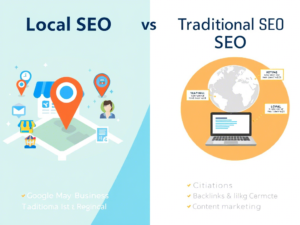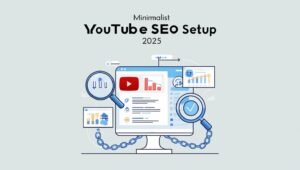Create a Website and Make Money Online
Introduction:
Your Website, Your Income – A Beginner’s Roadmap
Have you ever dreamed of breaking free from the 9-to-5 grind, working on your own terms, and tapping into the vast potential of online income? The idea of creating a website that not only showcases your passions but also generates a steady stream of cash is undeniably appealing.

The Reality Check: While the dream is attainable, it’s important to be realistic. Building a successful online business through your website takes dedication, effort, and the right knowledge. The good news? It’s absolutely doable, even for beginners.
Table of Contents
Building Your Online Empire: A Beginner’s Guide to Creating a Website and Making Money Online
- Choosing Your Niche: Your Passion is Your Profit
- The most successful online businesses are built on genuine passion. What topics excite you? What unique knowledge or skills do you have?
- Think about problems you can solve for others. Your niche should be something you’re not just interested in, but also something you can create valuable content and products around.
- Selecting a Domain Name: Your Digital Address
- Your domain name is your website’s unique identifier (like www.yourwebsitename.com [invalid URL removed]). It should be memorable, easy to spell, and relevant to your niche.
- You can purchase domain names from various registrars. Consider keywords related to your niche for better search engine visibility.
- Web Hosting Options: Where Your Website Resides
- Web hosting is like renting space on a server where your website files are stored. There are many options, from shared hosting (affordable but limited) to dedicated hosting (expensive but high-performance).
- Choose a hosting provider with reliable uptime, good customer support, and features like website builders or CMS compatibility.
- Website Builders vs. Content Management Systems (CMS)
- Website Builders: Ideal for beginners. They offer drag-and-drop interfaces, templates, and simple tools to get your site up quickly.
- CMS (e.g., WordPress, Joomla): More flexibility and customization options. Great for those who want complete control over design and functionality.
- Essential Pages: The Backbone of Your Website
- Every website needs a few basic pages:
- Homepage: Your website’s welcome mat. Make it engaging and informative.
- About Page: Share your story, mission, and what makes you unique.
- Contact Page: Make it easy for visitors to get in touch.
- Blog (Optional): A great way to share valuable content, attract visitors, and build your brand.
- Design Tips: Make a Great First Impression
- Keep your design clean, uncluttered, and easy to navigate.
- Use high-quality images and visuals.
- Choose colors and fonts that reflect your brand.
- Make sure your website is mobile-responsive (looks good on all devices).
Monetizing Your Website: Turning Your Passion into Profit
- There are numerous ways to make money online:
- Advertising: Display ads on your website.
- Affiliate Marketing: Promote other people’s products and earn a commission on sales.
- Selling Products or Services: Offer your expertise or create digital or physical products.
- Memberships/Subscriptions: Offer exclusive content or benefits to paying members.
Additional Tips for Beginners
- Learn SEO: Search engine optimization will help your website rank higher in search results.
- Create High-Quality Content: Engaging content will keep visitors coming back for more.
- Build an Email List: Email marketing is a powerful way to connect with your audience.
- Be Patient: Building a successful online business takes time and effort.
By following these steps and focusing on your passion, you can create a website that not only showcases your expertise but also helps you achieve your online business goals.
Website Monetization for Beginners: A Guide to Making Money Online
Creating a website is just the first step. The real magic happens when you turn your online presence into a source of income. Whether you’re a blogger, entrepreneur, or creative professional, these website monetization strategies can help you make money online.
1. Advertising: Turn Your Website Traffic into Cash
- Pay-Per-Click (PPC) Advertising: With platforms like Google AdSense, you can display ads relevant to your website’s content. Every time a visitor clicks on an ad (a “click-through”), you earn a small fee. The more traffic your website receives, the greater your potential earnings.
- Display Ads: These are the visual banners or boxes you see on many websites. You can partner with ad networks or individual companies to display their ads. You can earn money based on the number of impressions (views) or clicks.
2. Affiliate Marketing: Recommend and Earn
- How it Works: Join affiliate programs for products or services that align with your website’s niche. You’ll get unique affiliate links to share on your site. When someone clicks your link and makes a purchase, you earn a commission.
- Why It’s Great: It’s a low-risk way to start an online business because you don’t need to create your own products.
3. Selling Products or Services: Become Your Own Boss
- Physical Products: If you have a knack for crafting or curating, you can sell items directly through your website. Use an e-commerce platform to handle orders, payments, and shipping.
- Digital Products: Information is valuable! Create and sell e-books, online courses, templates, software, stock photos, or music. Digital products have low overhead costs and can be delivered instantly.
- Dropshipping: This is a great option for beginners. You partner with a supplier who handles inventory and shipping. You focus on marketing and customer service.

4. Membership Sites: Building an Exclusive Community
- The Concept: Offer premium content (articles, videos, forums) or special services that are only accessible to paying members. Create different membership tiers with varying benefits to appeal to a wider audience.
- Benefits: It provides a recurring income stream and fosters a loyal community around your website.
5. Digital Downloads: Share Your Knowledge
- What to Sell: E-books, online courses, printable worksheets, design templates, stock photos, music tracks – the possibilities are endless.
- Platforms: Use your website or platforms like Etsy, Creative Market, or Udemy to reach a wider audience.
Key Tips for Success
- Choose Your Niche: Focus on a specific topic or audience to attract loyal followers.
- Create High-Quality Content: Valuable content is the foundation of any successful website.
- Build an Email List: This is a direct way to connect with your audience and promote your products or services.
- Promote Your Website: Use social media, search engine optimization (SEO), and other marketing tactics to drive traffic.
By combining these monetization strategies, you can create multiple streams of income and turn your website into a thriving online business. Remember, patience and persistence are key. Don’t expect to get rich overnight, but with dedication, you can create a sustainable source of income online.
Website Monetization for Beginners: The Power of Valuable Content
Creating a website and hoping to make money online requires more than just setting up a flashy design. The secret ingredient? Valuable content that resonates with your target audience. By understanding your visitors and crafting content they crave, you lay the groundwork for a profitable online business.
1. Understanding Your Audience: The Heart of Content Creation
- Who Are They? Define your ideal visitor. What are their demographics (age, gender, location)? What are their interests and pain points?
- What Do They Want? Research their needs and preferences. What kind of information are they seeking? What problems are they trying to solve?
- Where Do They Hang Out? Identify the online platforms (social media, forums, etc.) where your audience spends their time.
2. Types of Content: Variety is the Spice of the Internet
- Blog Posts: Share informative articles, how-to guides, opinion pieces, or personal stories related to your niche.
- Videos: Create engaging tutorials, product reviews, vlogs, or interviews.
- Podcasts: Share audio content in the form of interviews, discussions, or educational episodes.
- Infographics: Present complex information in a visually appealing and easy-to-understand format.
- Other Formats: Explore webinars, e-books, whitepapers, or even interactive quizzes.
The key is to experiment and find the formats that best resonate with your audience.
3. SEO Basics: Get Found Online
- Keyword Research: Identify the words and phrases your target audience uses to search for information related to your niche.
- On-Page Optimization: Incorporate relevant keywords naturally into your content, titles, meta descriptions, and headings.
- Technical SEO: Ensure your website is mobile-friendly, loads quickly, and has a clear structure that is easy for search engines to crawl.
- Link Building: Earn backlinks from reputable websites to boost your website’s authority.
By mastering SEO basics, you can increase your website’s visibility in search engine results, attracting more organic traffic and potential customers.
4. Promoting Your Content: Spread the Word
- Social Media: Share your content on platforms like Facebook, Twitter, Instagram, LinkedIn, or Pinterest. Engage with your followers and participate in relevant groups or communities.
- Email Marketing: Build an email list and send regular newsletters with links to your latest content.
- Paid Advertising: Consider using platforms like Google Ads or social media ads to reach a wider audience.
- Collaborations: Partner with other bloggers, influencers, or businesses to cross-promote each other’s content.
The more eyes you get on your content, the more opportunities you have to generate leads, build relationships, and ultimately monetize your website.
Key Takeaways:
- Valuable content is the cornerstone of a successful website.
- Understand your audience and cater to their needs.
- Create diverse content in formats that resonate with your audience.
- Learn the basics of SEO to improve your website’s visibility.
- Actively promote your content to reach a wider audience.
By consistently creating high-quality content and promoting it effectively, you’ll attract a loyal audience, establish yourself as an authority in your niche, and open up a wealth of monetization opportunities.
Taking Your Online Business to the Next Level: A Beginner’s Guide to Growth
Creating a website and monetizing it are just the initial steps. To build a thriving online business, you need to cultivate growth. Here’s how to expand your reach, connect with your audience, and create a sustainable source of income online:
1. Building an Email List: Your Direct Line to Customers
- Why it Matters: Email marketing allows you to communicate directly with your audience. You can share updates, promote your products or services, and build a relationship with potential customers.
- How to Get Started: Offer valuable incentives (e-books, discounts, exclusive content) in exchange for email addresses. Place sign-up forms on your website, use pop-up boxes, and promote your email list on social media.
- Nurture Your List: Send regular newsletters with engaging content, personalized offers, and calls to action.
2. Engaging with Your Community: Building Relationships and Trust
- The Power of Connection: People are more likely to buy from businesses they know, like, and trust.
- Ways to Engage:
- Respond promptly to comments and questions on your website and social media.
- Host live Q&A sessions or webinars.
- Create a Facebook group or online forum where your audience can connect.
- Encourage user-generated content (reviews, testimonials, social media posts).
3. Tracking Your Progress: Using Analytics to Measure Success
- Data-Driven Decisions: Analytics tools like Google Analytics provide valuable insights into your website’s traffic, user behavior, and conversion rates.
- What to Track:
- Page views and unique visitors
- Bounce rate (how quickly people leave your site)
- Time on page (how long people stay)
- Conversion rate (percentage of visitors who take a desired action, like making a purchase)
- Use the Data: Analyze the data to identify what’s working and what’s not. Use this information to optimize your website, content, and marketing strategies.
4. Staying Up-to-Date: Adapting to Online Trends
- The Digital Landscape: The online world is constantly evolving. New technologies, platforms, and trends emerge regularly.
- Stay Informed:
- Follow industry blogs and news sites.
- Attend online conferences and webinars.
- Network with other online entrepreneurs.
- Adapt and Evolve: Be willing to experiment with new strategies and tools. Don’t be afraid to pivot your approach if something isn’t working.
Remember: Building a successful online business is a marathon, not a sprint. By focusing on building an email list, engaging with your community, tracking your progress, and staying up-to-date with the latest trends, you can create a sustainable and profitable online presence.

Taking Your Online Business to the Next Level: Advanced Website Monetization Strategies
Once you’ve mastered the basics of making money online with your website, it’s time to explore advanced strategies that can significantly boost your earning potential. These approaches require more effort and expertise, but they offer greater rewards for those willing to invest the time and energy.
1. Sponsored Content: Partnering for Profit
- How it Works: Brands are always looking for ways to reach new audiences. If your website has a dedicated following, you can leverage your influence to promote their products or services through sponsored content. This could be a blog post, video, social media post, or even a dedicated email campaign.
- Benefits: Sponsored content allows you to earn a substantial fee upfront, often with the potential for additional bonuses based on performance. It’s a great way to monetize your website without relying solely on ad revenue.
- Key Considerations: Ensure transparency by clearly disclosing sponsored content to your audience. Only partner with brands that align with your values and niche to maintain your credibility.
2. Consulting or Coaching: Monetizing Your Expertise
- The Value of Experience: If you have in-depth knowledge or skills in a particular area, sharing your expertise through consulting or coaching can be highly profitable. Offer one-on-one sessions, group workshops, or even create online courses to reach a wider audience.
- Building Your Brand: Position yourself as an authority in your field by showcasing your experience, credentials, and success stories. Use your website as a platform to share valuable content and attract potential clients.
- Pricing Your Services: Set your rates based on your experience, the value you provide, and your target market.
3. Webinars and Online Courses: Teaching for Profit
- Share Your Knowledge: Online learning is booming. Creating and selling webinars or online courses is a fantastic way to share your expertise with a global audience and generate recurring revenue.
- Creating Engaging Content: Structure your courses with a mix of video lessons, downloadable resources, quizzes, and interactive assignments. Offer live Q&A sessions or forums to foster community engagement.
- Choosing a Platform: Several platforms like Teachable, Udemy, or Thinkific make it easy to create, host, and sell your online courses.
4. Creating Your Own Products: The Ultimate Online Business
- More Control: By developing and selling your own products, you have complete control over the quality, pricing, and marketing strategy. This can lead to higher profit margins and greater creative freedom.
- Diverse Options: Consider physical products (apparel, crafts, home goods), digital products (e-books, courses, templates), or even software solutions.
- Building a Brand: Your products become an extension of your brand, fostering customer loyalty and repeat business.
Additional Tips for Success
- Email Marketing: Build a strong email list to nurture relationships with your audience and promote your products or services.
- Social Media Marketing: Engage with followers on social media to build brand awareness and drive traffic to your website.
- Networking: Connect with other online entrepreneurs and influencers to collaborate on projects and share ideas.
- Continuous Learning: Stay updated on the latest trends in your niche and invest in ongoing education to enhance your skills and knowledge.
By implementing these advanced monetization strategies, you can transform your website from a simple online presence into a thriving business that generates substantial income and fulfills your entrepreneurial aspirations.
conclusion
Embark on Your Online Business Journey: Start Earning Today
Creating a website and making money online might seem like a daunting task, but it doesn’t have to be. With the right strategies and resources, you can turn your website into a profitable online business, even as a beginner.
Don’t Wait, Start Now!
The key to success is to take action. Even small steps can lead to significant results over time. Start by choosing a website monetization strategy that aligns with your interests and skills. Experiment with different approaches and see what works best for you. Remember, the most successful online businesses started with a single step.
Resources to Help You Succeed
- Online Courses and Tutorials: Learn the ins and outs of website monetization, digital marketing, and online business strategies. Platforms like Coursera, Udemy, and Skillshare offer a wide range of courses for beginners and experienced entrepreneurs alike.
- Website Building Platforms: Choose a user-friendly platform like WordPress, Wix, or Squarespace to create a professional-looking website without needing to code.
- Online Communities and Forums: Connect with fellow website owners and online entrepreneurs to share ideas, get feedback, and find support.
- E-commerce Platforms: If you plan to sell products, consider platforms like Shopify, WooCommerce, or Etsy to set up your online store.
- Affiliate Networks: Explore affiliate networks like Amazon Associates, ShareASale, or ClickBank to find products and services to promote.
- Freelancing Platforms: If you’re offering freelance services, check out platforms like Upwork, Fiverr, or Guru to connect with clients.
Your Website Monetization Adventure Begins!
Remember, building a successful online business takes time and dedication. Don’t get discouraged by setbacks or slow progress. Learn from your mistakes, stay informed about industry trends, and adapt your strategies as needed.
FAQs ( frequently Asked Question)
How much can I earn from my website?
There’s no one-size-fits-all answer. Your earnings will depend on various factors, including:
Traffic: The more visitors your website receives, the greater your earning potential.
Monetization Methods: Some methods, like selling high-priced courses, can be more lucrative than others, like display ads.
Niche: Some niches are more profitable than others. For example, finance and health websites often command higher ad rates.
Quality of Content: High-quality, engaging content attracts more visitors and keeps them coming back for more.
Which monetization strategy is best for beginners?
Affiliate marketing and display advertising are often the easiest to get started with. They require minimal upfront investment and technical knowledge. However, the best strategy for you will depend on your skills, interests, and niche.
How long does it take to start making money?
It varies. Some website owners see results within a few months, while others may take a year or more. The key is to be patient, consistent, and focused on creating valuable content that attracts and engages your target audience.
Do I need a lot of traffic to start earning?
Not necessarily. While high traffic can lead to more earnings, even small websites can generate income through affiliate marketing, digital products, or sponsored content. Focus on building a loyal audience and providing value, and the traffic will follow.
Is it necessary to have a niche for my website?
Having a niche helps you target a specific audience and stand out from the competition. However, it’s not mandatory. You can still monetize a general interest website, but it might be more challenging to attract a loyal following.
Can I use multiple monetization strategies on my website?
Absolutely! In fact, it’s recommended to diversify your income streams. For example, you could combine display ads with affiliate marketing and digital product sales. This way, if one strategy underperforms, you have others to fall back on.
How do I get started with website monetization?
Choose Your Niche (if applicable): Focus on a topic you’re passionate about.
Build Your Website: Use a website builder or CMS like WordPress.
Create High-Quality Content: Publish blog posts, articles, videos, or other content that your target audience will find valuable.
Choose Your Monetization Strategies: Experiment with different methods and see what works best for you.
Promote Your Website: Drive traffic through SEO, social media, and other marketing channels.
Track Your Results: Use analytics tools to monitor your progress and optimize your strategies.





